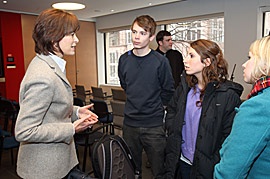
By Neale McDevitt
Given worldwide concern about the perilous state of the global economy, it was no surprise that Principal Heather Munroe-Blum fielded some tough questions about McGill’s finances during a packed Town Hall on Feb. 10.
Recent reports in local media about salaries and severance payments paid to some senior McGill administrators sparked a number of questions.
“I don’t for one moment apologize for our commitment to having a very high, competent level of professional administration and management at McGill in service of our academic mission,” Munroe-Blum said. “We hire to our executive officer positions on the basis of national and international searches and if we want to get top people, our compensation has to be somewhere in that competitive market.
“Remember again that executive officers who come to the University not in a tenured stream position … come in on a time-limited contract. To a person they’ve been recruited from lucrative jobs,” Munroe-Blum said. “I’m not going to say it’s not a lot of money – of course it’s a lot of money. But it is consistent with what we need to do to compete with the best.”
The turnout was considerably higher than for most recent Town Hall meetings. This was due in part to the urging of MUNACA, which represents support staff, and which is in negotiations with the University for a new contract.
When questions turned specifically to a severance package paid to Ann Dowsett Johnston, former Vice-Principal of Development, Alumni and University Relations, who was at McGill for 19 months, the Principal expressed regret. “It is unfortunate that it didn’t work out, but, as I said earlier, I don’t make apologies for us paying market-driven salaries for top talent. I am sorry when it doesn’t work but I think our record of recruitment and retention has been a very strong one.”
When one participant asked how the University could “recently create more than eight new senior administration positions” in such financially troubled times, Munroe-Blum was quick to point out that “we didn’t create new positions, we filled them. And, in filling them, in two of the senior portfolios, we took out a senior position.”
On salaries for support staff, Munroe-Blum pointed out that the University benchmarks employee groups differently. The salaries for the professoriate and executive officers are benchmarked according to national and international standards, whereas all other salaries are benchmarked more locally. “We’ve been very fair in compensation at the local level,” Munroe-Blum said.
Even students present in the MBA Lounge of the Desautels Faculty of Management had money on their minds. One PhD candidate asked for clarification on McGill’s policy toward tuition fees for graduate and undergraduate students.
“At the graduate level, consistent with our mission, we are seeking full student support,” Munroe-Blum explained. “We’ve been publicly lobbying, with some success, to get more federal investment in Doctoral and Masters fellowships – and we saw 600 new fellowships in the last federal budget in January.
“We’ve made enormous progress, but we’re still not where we want to be.”
On the undergraduate side of things, the Principal said, McGill is looking for a “re-regulation” of tuition fees that would bring levels up to the Canadian average. That being said, Munroe-Blum stressed that an increase in tuition would also come with a commitment to making sure that 30 per cent of every new net dollar raised as a result of re-regulation would “go to student support.”
Finances also figured prominently at the McGill Senate meeting on Feb. 12, as Munroe-Blum recapped key points from the open letter she had sent earlier in the week on the financial challenges stemming from the economic downturn. In the letter, she urged all members of the McGill community to share ideas on ways to work smarter and realize efficiencies, so the university can weather tough economic times without undercutting the quality of its academic programs.
Already, Munroe-Blum said, a number of “really clever ideas” have been brought forward that could have immediate bottom-line impact.
